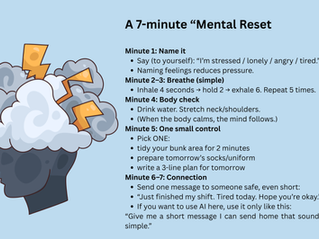How to Handle Conflict with Fellow Crew Members – Strategies for De-escalating Tension Onboard
- IMEQ CENTER
- May 6, 2025
- 3 min read

Working at sea comes with unique challenges—long hours, demanding tasks, and living in close quarters with the same people for months. While teamwork and camaraderie are essential, conflicts are inevitable. Knowing how to handle disagreements effectively can make all the difference between a smooth voyage and a stressful one. Here’s how you can manage and de-escalate tension while working at sea.
1. Stay Calm and Pause Before Reacting
When conflicts arise, your initial reaction might be frustration or anger. However, reacting impulsively can escalate the situation. Instead:
Take a deep breath and count to ten.
Step away for a moment if needed.
Give yourself time to cool down before addressing the issue.
A calm response can prevent unnecessary arguments and set the stage for a more productive conversation.
2. Communicate Clearly and Respectfully
Miscommunication is one of the biggest causes of conflict on board. To avoid misunderstandings:
Speak clearly and calmly.
Use "I" statements instead of pointing fingers. For example, say, “I feel frustrated when my input is ignored,” rather than, “You never listen to me.”
Keep emotions in check and avoid raising your voice.
Clear and respectful communication fosters understanding and cooperation.
3. Listen Actively
Many conflicts stem from people feeling unheard. Show that you respect the other person's perspective by:
Maintaining eye contact and nodding.
Avoiding interruptions while they speak.
Summarizing their point to confirm understanding.
Sometimes, simply listening can defuse tension and lead to a quicker resolution.
4. Address Issues at the Right Time and Place
Timing and setting matter when resolving conflicts. Instead of confronting someone in the middle of a stressful shift:
Find a private, quiet space to talk.
Choose a moment when both parties are calm and available.
Avoid discussing sensitive issues in front of others.
A well-timed conversation increases the chances of finding a resolution.
5. Focus on Finding Solutions, Not Blame
Rather than dwelling on who is right or wrong, shift your mindset to problem-solving:
Ask, “How can we fix this together?”
Find common ground and propose compromises.
Keep the bigger picture in mind—a safe and efficient voyage depends on teamwork.
Collaboration leads to stronger relationships and a better working environment.
6. Case Scenario: Ratings vs. Officers Communication Challenges
Scenario 1: Miscommunication Over Orders
A deck officer gives instructions to a rating during a mooring operation, but the rating misunderstands due to unclear wording. The officer assumes the task is being done correctly, only to realize a mistake later, leading to frustration on both sides.
Resolution:
The officer ensures that instructions are given in simple, clear terms and asks the rating to repeat them to confirm understanding.
The rating, if unsure, asks for clarification instead of assuming.
Both parties agree to use hand signals or confirm verbally in high-stress situations to avoid errors.
Scenario 2: Perceived Disrespect
A rating feels ignored by an officer who dismisses his concerns about a faulty piece of equipment. The rating believes his experience is not valued, while the officer assumes the rating is overreacting.
Resolution:
The officer takes a moment to listen and acknowledge the rating’s concern.
The rating presents the issue factually and professionally rather than emotionally.
They work together to assess the problem, reinforcing mutual respect and teamwork.
Scenario 3: Tension Due to Workload Distribution
An officer assigns tasks unevenly, leading ratings to feel overworked while officers appear to have lighter duties. Resentment builds, affecting morale and teamwork.
Resolution:
A discussion is held where ratings express their concerns constructively.
Officers explain task allocation and consider redistributing work more fairly.
Regular check-ins ensure everyone feels valued and workloads remain balanced.
7. Know When to Seek Help
If a conflict remains unresolved despite your efforts, don’t hesitate to involve a senior officer or a neutral third party:
Seek guidance from someone with experience.
Explain the issue professionally and objectively.
Remember, asking for help isn’t about “telling on” someone—it’s about maintaining a positive and safe work environment.
Mediation can help bring fresh perspectives and fair solutions.
8. Prioritize Teamwork and Professionalism
At the end of the day, everyone on board has the same goal: a safe and successful voyage. Keep these principles in mind:
Respect and support your fellow crew members.
Put personal differences aside for the sake of the team.
Maintain a professional attitude, even in difficult situations.
A strong, cooperative crew makes for a safer and more enjoyable experience at sea.
Conflicts at sea are inevitable, but how you handle them makes all the difference. By staying calm, communicating effectively, and focusing on teamwork, you can turn disagreements into opportunities for growth.
The next time tensions rise, take a deep breath, step back, and apply these strategies. You’ll reduce stress, strengthen relationships, and contribute to a more positive environment on board.
Safe sailing and smooth seas ahead!
Alexandra Kaloulis
IMEQ TEAM
























